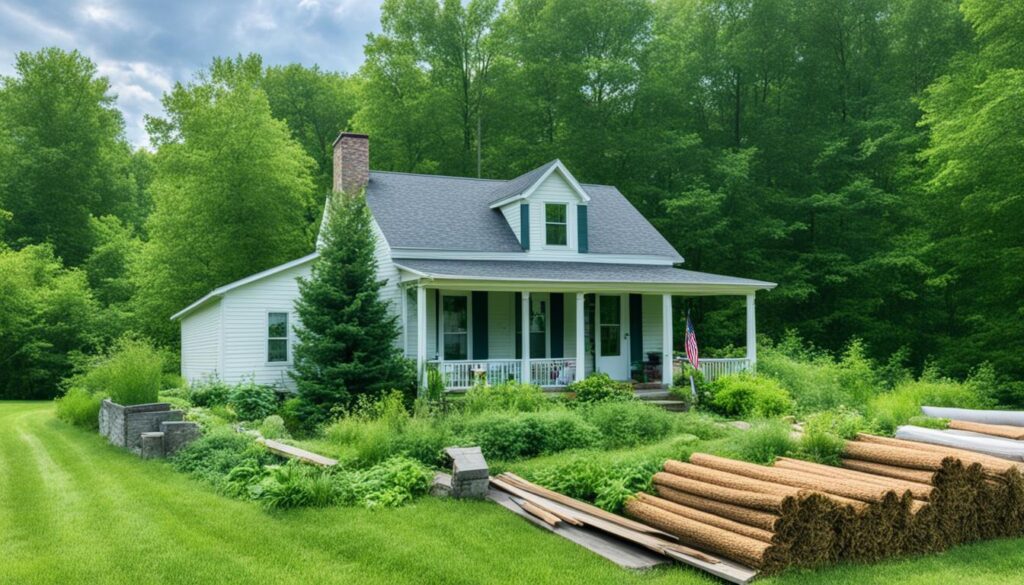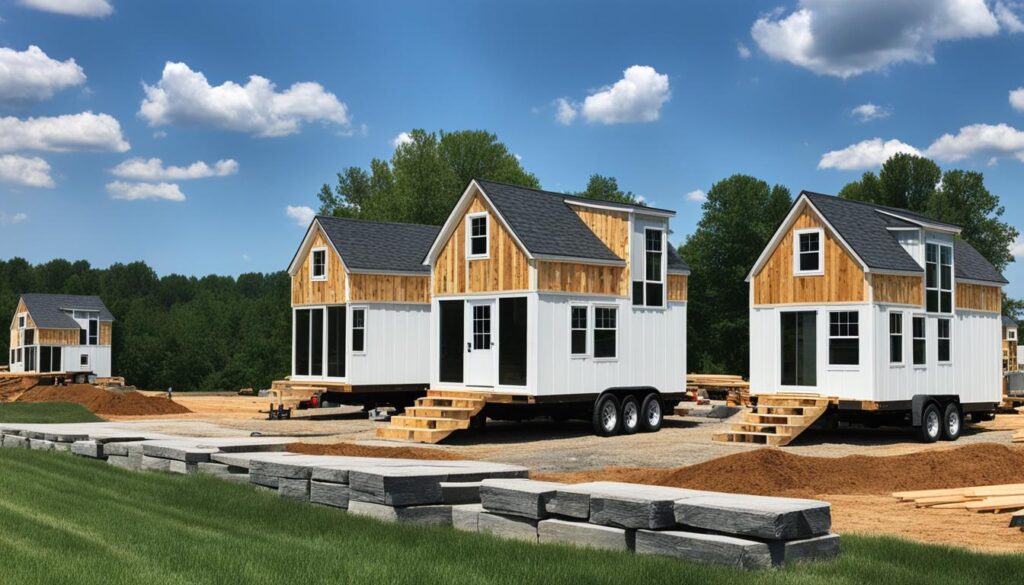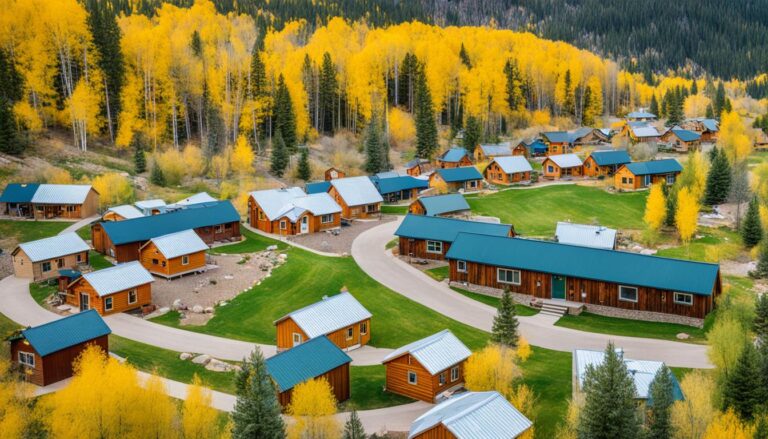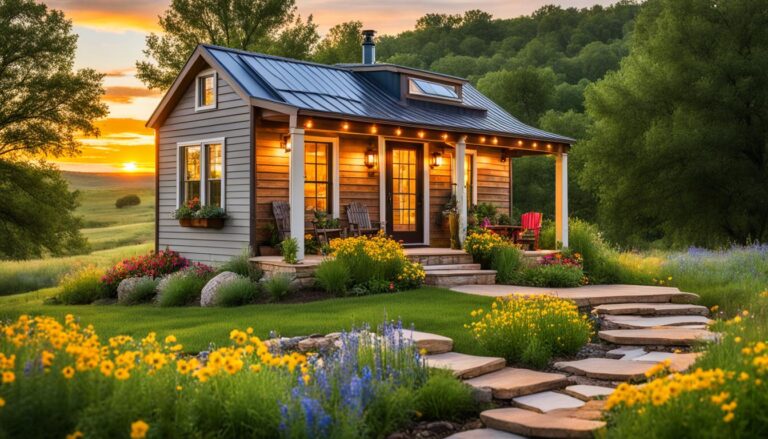Tiny House Placements in Kentucky – Your Options
Where can I put a tiny house in Kentucky? What are the zoning laws and regulations for tiny house placement in the state? If you’re considering living in a tiny house in Kentucky, it’s essential to understand the options available to you and the legalities involved.
Unlike some other states, Kentucky does not have statewide rules specifically designed for tiny homes. Instead, the legality of living in a tiny house is determined by county governments, and the regulations can vary widely from one county to another. This means that before you start your tiny home project, it’s crucial to research the rules and regulations in your desired location.
So, what are your options for placing a tiny house in Kentucky? Let’s explore the possibilities.
Key Takeaways:
- Kentucky does not have statewide regulations specifically for tiny houses.
- County governments determine the legality of living in a tiny house in Kentucky, and regulations can vary.
- Jefferson County and Fayette County are among the counties open to conversations about tiny houses.
- Tiny houses on foundations must adhere to the Kentucky Building Code, while tiny houses on wheels need to meet RVIA regulations.
- Options for living in a tiny house in Kentucky include private properties, RV parks, national parks and campgrounds, and tiny house communities.
Kentucky Tiny House Regulations
Kentucky does not have specific statewide regulations for tiny houses. The legality of living in a tiny house is determined by county governments, and the regulations can vary.
Tiny houses on foundations must comply with the Kentucky Building Code, which includes regulations for ceiling height, windows, plumbing, stairs, and emergency exits. Tiny houses on wheels need to meet Recreational Vehicle Industry Association (RVIA) regulations.
It’s important to research and follow local zoning regulations and consult with county officials to ensure compliance with building and placement regulations for tiny houses in Kentucky.
When building a tiny house in Kentucky, it is crucial to understand and adhere to the Kentucky Building Code for houses on foundations and RVIA regulations for houses on wheels. These codes outline safety standards and requirements for electrical systems, plumbing, emergency exits, and more. By following these regulations and consulting with local authorities, you can ensure that your tiny house meets the necessary standards and remains legally compliant.
Living Off-Grid in Kentucky
Living off-grid in Kentucky offers an opportunity to disconnect from traditional utility systems and embrace a more self-sufficient lifestyle. While regulations regarding off-grid living may vary depending on the location, rural areas in Kentucky often have fewer restrictions, allowing for alternative setups for water, power, and sewer systems.
When it comes to off-grid water and power in Kentucky, there are various options to consider. Installing rainwater collection systems can provide a sustainable source of water for everyday needs. Additionally, solar panels can be utilized to generate electricity for powering appliances and lighting. It’s important to research and invest in efficient solar power systems that can meet your energy needs.
While off-grid sewage systems, such as septic tanks, are generally not allowed in Kentucky due to stringent pollution regulations, composting toilets are a viable alternative for managing waste in an environmentally friendly manner. Composting toilets convert human waste into nutrient-rich compost that can be safely used in gardens or landscaping.
It’s important to note that regulations and codes governing off-grid living in Kentucky can vary, especially in more populated areas. It’s recommended to research and comply with local regulations and building codes to ensure legal and safe off-grid living.
“Living off-grid allows individuals and families to reduce their environmental impact and gain more control over their lifestyles,” says Jane Smith, an off-grid living enthusiast in Kentucky. “We enjoy the freedom and self-reliance that comes with generating our own power and collecting rainwater.”
Living off-grid in Kentucky requires careful planning and consideration. It’s crucial to assess your needs, research sustainable practices, and consult with experts to ensure the off-grid systems you implement are efficient and compliant with local regulations.
While off-grid living provides numerous benefits, such as independence, reduced utility bills, and environmental sustainability, it’s important to understand the challenges associated with this lifestyle. Limited access to certain amenities, rigorous maintenance routines, and potential restrictions in more populated areas should be taken into consideration.
If you’re considering living off-grid in Kentucky, it’s advisable to connect with local off-grid communities or individuals who have experience in this lifestyle. Learning from their firsthand experiences and insights can help you navigate the unique challenges and opportunities that come with off-grid living in Kentucky.
Where to Park a Tiny House in Kentucky
Finding a suitable location to park a tiny house in Kentucky requires an understanding of the zoning regulations in each county and town. Zoning regulations can vary significantly, and many jurisdictions require even small houses to have sturdy foundations.
Here are some options for parking a tiny house in Kentucky:
- Parking on private properties: Some property owners in Kentucky may allow you to park your tiny house on their land. It’s important to check local zoning regulations and obtain permission from the property owner before parking your tiny house on private land.
- RV parks: Many RV parks in Kentucky offer spaces for tiny house parking. These parks typically have amenities such as electricity hookups, water connections, and waste disposal facilities.
- National parks and campgrounds: Some national parks and campgrounds in Kentucky allow tiny house parking. These locations offer scenic surroundings and recreational opportunities.
- Tiny house communities: There are several tiny house communities in Kentucky that provide dedicated spaces for tiny house parking. These communities often offer a sense of community and shared amenities.
An example of a tiny house community in Kentucky is Bluegrass Tiny Ridge, located in central Kentucky. This community offers specific spaces for tiny house parking and provides a supportive environment for tiny house living.
When parking a tiny house in Kentucky, it’s important to thoroughly research and comply with local zoning regulations to ensure legal placement. Consult with local authorities and seek their guidance to ensure you are following all applicable zoning regulations for parking a tiny house in Kentucky.
Kentucky Tiny House Communities
Kentucky is home to a growing number of tiny house communities that offer a unique and controlled setting for those interested in tiny house living. These communities provide an opportunity to connect with like-minded individuals and enjoy the benefits of a close-knit community.
One notable aspect of tiny house communities in Kentucky is their focus on specific populations. For example, there are proposals for a small home community in Louisville that aims to provide housing for homeless veterans. Additionally, there is a planned community in Harlan County that is dedicated to offering homes to homeless students who have completed drug rehabilitation.
It’s important to note that each tiny house community in Kentucky may have its own set of regulations and requirements for residents. These regulations may include restrictions on the size and design of the tiny house, as well as guidelines for community participation and maintenance.
Before joining a tiny house community in Kentucky, it’s crucial to thoroughly research and understand the rules and regulations governing the community. This will help ensure a positive and fulfilling experience within the community.
Building Considerations for Kentucky Tiny Houses
When it comes to building a tiny house in Kentucky, it’s essential to take into account the state’s weather conditions and ensure the construction is capable of withstanding fluctuations in temperature and humidity. Kentucky experiences mild winters and hot summers, so it’s crucial to prioritize effective climate control and insulation in the design.
In addition to weather considerations, it’s important to familiarize yourself with the construction regulations for tiny houses in Kentucky. Building codes and regulations can vary depending on the city and county, so thorough research is necessary. By adhering to all applicable regulations, you can ensure a smooth and compliant construction process.
As you plan the construction of your tiny house, consider the placement on the site. Strategic landscaping can enhance the aesthetics and functionality of the property. Moreover, exploring options for deck construction can provide additional outdoor living space, perfect for enjoying the beautiful Kentucky surroundings.
“Choosing the right materials and construction techniques to withstand the Kentucky climate is essential for the long-term durability and comfort of your tiny house.”
Exploring Sustainable Solutions
Incorporating sustainable features in your tiny house construction can contribute to energy efficiency and reduce your carbon footprint. Solar power is an excellent option to consider, providing a renewable energy source that can help offset electricity costs.
By harnessing the power of the sun, you can reduce your environmental impact and potentially achieve off-grid living in Kentucky. Before installing solar panels, consult with a professional to determine the ideal placement for maximum sun exposure and optimal energy generation.
Customizing Your Kentucky Tiny House
Building a tiny house allows for creative customization to suit your specific needs and preferences. Incorporate features and design elements that align with your lifestyle and enhance the functionality of the space.
Consider integrating storage solutions, multi-purpose furniture, and efficient space utilization techniques to maximize the usable area within your tiny house. This attention to detail and thoughtful customization can transform your tiny house into a comfortable and inviting home.
- Investigate different building materials and finishes to find options that offer both durability and aesthetic appeal.
- Focus on insulation to ensure optimal temperature control and energy efficiency.
- Consult with professionals experienced in tiny house construction to ensure compliance with building codes and optimize the design.
By carefully considering these building considerations and incorporating sustainable solutions, you can create a beautiful and functional tiny house that is well-suited to the unique climate of Kentucky.
Kentucky Tiny House Building Code
Tiny houses in Kentucky must comply with the Kentucky Building Code, which outlines the construction regulations and requirements for these small dwellings. The code sets standards for various aspects of a tiny house, including ceiling height, windows, plumbing, stairs, and emergency exits. It ensures that tiny houses in Kentucky are safe and structurally sound.
It’s important to note that in addition to the statewide building code, each city and county may have additional regulations and requirements that need to be followed. These local regulations may impact specific aspects of the construction process or outline additional guidelines for tiny house builders.
Complying with the Kentucky Building Code and any local regulations can be a complex process. That’s why working with a certified tiny house builder is highly recommended. A certified builder will be well-versed in the building code requirements and can ensure that your tiny house meets all the necessary criteria for permitting and inspections.
Benefits of Working with a Certified Tiny House Builder
Partnering with a certified tiny house builder in Kentucky offers several advantages. First and foremost, these builders are knowledgeable about the state and local regulations and have experience navigating the permitting process. They can guide you through the construction process and help you ensure compliance with all building code requirements.
Additionally, certified builders follow high production standards, which means that the quality of their workmanship and materials used in building your tiny house will be top-notch. This can give you peace of mind knowing that your tiny house is well-built and safe.
Furthermore, working with a certified builder can make it easier to access financing options and obtain insurance coverage for your tiny house. Many lenders and insurance providers prefer to work with certified builders because of the confidence they have in their expertise and adherence to building regulations.

In conclusion, to ensure compliance with the Kentucky Building Code and any local regulations, it’s important to work with a certified tiny house builder. They will guide you through the construction process, ensure that your tiny house meets all the necessary criteria, and make the permitting process smoother. By partnering with a certified builder, you can have confidence in the quality, safety, and compliance of your tiny house in Kentucky.
Tiny House Financing and Insurance in Kentucky
When it comes to financing and insuring a tiny house in Kentucky, there are some considerations to keep in mind. While there are no specific financing options tailored specifically for tiny houses, there are alternative options available. Some lenders offer personal loans or RV loans that can be used for purchasing a tiny house in Kentucky. These loans can provide the financial support needed to fund your tiny house project.
Insurance coverage for tiny houses in Kentucky can vary, so it’s important to work with an insurance provider who understands the unique needs of tiny house owners. Look for an insurance policy that covers your tiny house as both a dwelling and personal property. This will ensure that you have adequate coverage in case of accidents, natural disasters, or theft.
Working with a certified tiny house builder in Kentucky can also make it easier to access financing and insurance options. Certified builders often have established relationships with lenders and insurance providers, which can streamline the process and help you find the best financing and insurance solutions for your tiny house.
Financing and insuring a tiny house may require some extra effort and research compared to traditional homes, but with the right resources and support, you can make your tiny house dream a reality in Kentucky.
Benefits of Financing a Tiny House in Kentucky
- Flexible loan options: Personal loans and RV loans can be used to finance your tiny house purchase.
- Less financial burden: Tiny houses are generally more affordable than traditional homes, making them an attractive option for those looking to reduce their expenses.
- Opportunity for ownership: Financing allows you to own a home without the need for a traditional mortgage.
- Build equity: Owning a tiny house gives you the opportunity to build equity over time.
Working with a certified builder can make it easier to access financing and insurance options for a tiny house in Kentucky.
Factors to Consider When Insuring a Tiny House in Kentucky
- Coverage options: Look for an insurance policy that covers your tiny house as both a dwelling and personal property.
- Customizable coverage: Work with an insurance provider who can tailor the coverage to meet your specific needs as a tiny house owner.
- Reputation of the insurance provider: Research and choose an insurance provider with experience in insuring tiny houses.
- Understanding local regulations: Ensure that your insurance policy meets any requirements set by local zoning regulations and building codes.
By carefully considering your financing and insurance options, you can protect your investment and enjoy the benefits of tiny house living in Kentucky.
Pros and Cons of Living in a Tiny House in Kentucky
Living in a tiny house in Kentucky offers several advantages, including affordability, efficiency, and the opportunity to minimize one’s life. Tiny houses in Kentucky provide a chance to embrace a simplified and environmentally-friendly lifestyle.
Pros of living in a tiny house in Kentucky:
- Affordability: Tiny houses are more cost-effective compared to traditional homes, allowing for reduced expenses on mortgage payments, utilities, and maintenance.
- Efficiency: With limited space, tiny houses promote efficient living, encouraging individuals to prioritize essential belongings and eliminate clutter.
- Sustainability: Tiny houses consume less energy and resources, reducing their environmental impact and allowing residents to lead a more sustainable lifestyle.
- Connection to Nature: Many tiny houses in Kentucky are located in serene and natural settings, offering residents the opportunity to enjoy beautiful outdoor surroundings.
- Mobility: For tiny houses on wheels, the ability to easily tow or relocate provides flexibility in choosing where to live.
Cons of living in a tiny house in Kentucky:
- Limited Space: The compact size of a tiny house can present challenges, requiring careful organization and creative storage solutions to maximize living space.
- Zoning Regulations: The placement of a tiny house in Kentucky is subject to county zoning regulations, with varying restrictions and requirements that must be navigated.
- Proper Planning and Research: Building and living in a tiny house requires thorough planning, research, and knowledge of local regulations to ensure compliance.
- Infrastructure and Amenities: Tiny houses may have limited access to traditional utilities, such as water and electricity, requiring alternative solutions and careful consideration of off-grid options.
When considering the pros and cons of living in a tiny house in Kentucky, it’s crucial to weigh personal preferences, lifestyle needs, and the ability to adapt to a smaller living space. Researching local regulations, consulting with experts, and visiting existing tiny house communities can provide valuable insights into the realities of tiny house living in Kentucky.
“Living in a tiny house allows individuals to redefine their priorities, focus on what truly matters, and live a more intentional life.” – ESH Utility Buildings
For more information on tiny home regulations in Kentucky, visit this article by ESH Utility Buildings.
Finding a Certified Tiny House Builder in Kentucky
Choosing a certified tiny house builder in Kentucky is essential for ensuring quality construction and compliance with building codes and regulations. By working with a reputable builder, you’ll have easier access to financing, insurance, and other benefits.
One example of a certified tiny house builder in Kentucky is Great Lakes Tiny Homes. They are an RV Industry Association (RVIA) certified builder, which means they adhere to high production standards and building regulations. With their expertise and experience, you can have confidence in the construction of your tiny house.
When selecting a tiny house builder in Kentucky, it’s recommended to research and compare different options. Look for builders who have a proven track record, positive customer reviews, and a portfolio of completed projects. This will give you a better understanding of their workmanship and the quality of their tiny homes.
Additionally, consider the builder’s ability to customize the design and features of your tiny house according to your preferences and needs. Communication and collaboration with the builder throughout the construction process are important factors to ensure your vision is realized.
Why Choose a Certified Builder?
Working with a certified builder provides peace of mind that your tiny house will be built to code and meet industry standards. This certification ensures that the builder has the necessary knowledge and skills to construct a safe and structurally sound tiny home.
Furthermore, a certified builder may have established relationships with financing institutions and insurance providers, making it easier for you to secure financial support and obtain suitable insurance coverage for your tiny house in Kentucky.
As you explore your options, consider reaching out to different certified tiny house builders in Kentucky for consultations and quotes. This will allow you to assess their expertise, discuss your project requirements, and determine if they are the right fit for your needs.
Remember to ask for references and visit completed projects if possible. This firsthand experience will give you a better understanding of the builder’s craftsmanship and attention to detail.
By choosing a certified tiny house builder in Kentucky, you’ll be able to embark on your tiny house journey with confidence, knowing that your project is in capable hands.

To learn more about tiny house builders, you can visit the website of The Tiny Life, a valuable resource for connecting with reputable builders and exploring additional options.
Tiny House Living as a Permanent Residence in Kentucky
Living in a tiny house as a permanent residence in Kentucky is not only possible but also a popular housing option for many individuals and families. While the specific regulations and requirements may vary depending on the location, tiny houses are generally legal in Kentucky, making it a viable choice for those seeking a simpler and more sustainable lifestyle.
When considering living in a tiny house as a permanent residence in Kentucky, it is crucial to comply with zoning regulations and building codes. Each county and city may have its own set of regulations, so it’s important to consult with local zoning officials and building authorities to ensure that your tiny house meets all the necessary requirements.
Obtaining the necessary permits and inspections is also an essential step in establishing your tiny house as a permanent residence. By following the proper procedures, you can ensure that your tiny house meets all the legal requirements for long-term living in Kentucky.
While living in a tiny house offers numerous benefits, such as affordability and a reduced environmental footprint, it’s essential to be aware of the challenges that may arise. Limited space and zoning regulations are factors to consider when planning to live in a tiny house in Kentucky.
However, despite these challenges, many individuals find that the advantages of tiny house living far outweigh the obstacles. The freedom to live more sustainably, the financial benefits, and the opportunity to simplify one’s life make tiny house living an attractive option for many people.
For more information on the legality of tiny houses in Kentucky and the regulations for living in a tiny house as a permanent residence, you can visit realtor.com.
Living in a tiny house permanently in Kentucky provides the opportunity to experience a simpler and more sustainable lifestyle. By following the proper regulations and staying informed about local zoning and building codes, you can enjoy the benefits of tiny house living in the beautiful state of Kentucky.
Conclusion
In Kentucky, there are several options for placing a tiny house. You can choose to put your tiny house on private properties, RV parks, national parks and campgrounds, or even join a tiny house community. However, it’s important to note that the regulations for tiny house placement in Kentucky vary depending on the county and city. To ensure compliance and a smooth process, it’s crucial to research and understand the specific zoning regulations and building codes for your desired location.
To navigate through the complex regulations, it’s advisable to work with a certified builder and consult with local authorities. Their expertise can help you understand the requirements and permits needed to build and reside in a tiny house in Kentucky. By adhering to the regulations, you can enjoy the benefits of simplified living, affordability, and the opportunity to embrace a more sustainable lifestyle.
For more information on tiny house placement regulations in Kentucky, you can visit the AARP Kentucky website. They provide valuable insights and resources regarding accessory dwelling units in the state.







